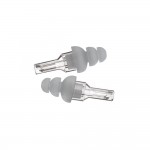Hearing Loss
- Marlene
- Blog, flute, Uncategorized
- No Comments
Hearing Loss
Hearing loss is a big problem for musicians.
A musician’s most important sense is hearing. When musicians experience hearing loss, it can end a career. Hearing loss can occur from exposure to loud noise, aging, or neurological problems. For orchestral musicians, hearing loss can cause difficulty with tuning and blend. Music teachers with hearing loss may have trouble detecting and fixing errors.
Hearing problems are not limited to diminished hearing. Exposure to loud sounds can also cause tinnitus, also known as ringing in the ears. You may have experienced this after listening to a loud concert. Tinnitus, can be temporary or permanent, but it can have devastating consequences for musicians.
Hearing Loss Affects 40% of Musicians according to a survey conducted by Charity Help Musicians UK.
A German research study from 2014 studied the incidence of hearing problems in musicians versus the general public. The study observed that hearing loss is an occupational hazard for musicians. It concluded
Professional musicians have a high risk of contracting hearing disorders. Use of already available prevention measures should reduce the incidence of HL (hearing loss) in professional musicians.
I have had my hearing testing and I have lost some of the high end of my hearing, probably from playing piccolo. My husband and kids are able to hear higher pitches than I can. Although I now use ear plug when practicing high notes, I wish I had known about using ear protection while in high school.
Let’s talk about safety.
I am concerned that high school students are being exposed to loud noise in marching band. Perhaps the noise level is appropriate on a football field, but when rehearsals are inside, the noise level is extreme. Even on the football field, the instruments are often held close to the head. There were many times I had a trumpet blowing in my ear during close formations. My ears would ring after marching band rehearsals.
Two of my students are playing in a “BLAST” concert next week. At the end of the marching band season, some local high schools bring the competition show inside for a final performance in the school auditorium. There will be over a hundred band students playing music intended for a stadium, but they will be playing in an auditorium. I’ve never been to the “BLAST” concert, but everyone says it is extremely loud. Do the kids play with ear protection? I asked my students and they looked at me like I was from Mars. Do the parents and siblings in the audience wear ear protection? No. This is a horrible idea! Everyone within 2 miles of the high school should be wearing heavy-duty ear protection.
Hearing loss is not cool. Tinnitus is not fun. We don’t let the football team go on the field without pads. We shouldn’t let the marching band play the halftime show without earplugs.
A simple solution: wear ear protection.
My favorite ear protection is the ER-20.
The ER-20 earplugs are comfortable to wear, virtually invisible, and protect your hearing. Unlike foam earplugs, these reduce the volume by 12dB across the spectrum, which means things sound the same… just quieter. You can still hear voices well, which is important in a rehearsal. I wear the ER-20 earplugs anytime I play piccolo (practice at home, rehearsals, and concerts). I also use them at rock concerts and at movie theaters. (Am I the only one that thinks the volume is too high at the movies?!) My husband uses them when tuning pianos. Losing his hearing would also be terrible for his career. These earplugs allow my husband to adjust pitch, but the loud test blows will not damage his hearing.
The ER-20 earplugs can be purchased on Amazon here.
The price of the ER-20 earplugs has come down since I purchased a pair. Now you can own a pair for less than $15. I’ve had mine for about 20 years and keep them in my flute case. The best solution for hearing protection for musicians is to purchase custom molded ear protection, but these are expensive. Because foam earplugs are available at every convenience store for cheap, everyone should have some. We buy them by the box for mowing the grass and working with power tools. But even if you forget your ER-20 earplugs and can’t get to a Walgreens for foam plugs, you can wad up a piece of tissue or toilet paper and put it in your ears. Make sure the piece is large enough that it won’t get stuck in you ear canal. You won’t win any awards for fashion, but you may save your hearing!


No comments.